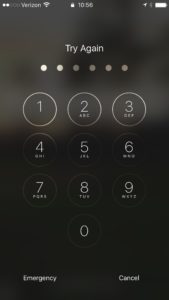
This morning another story hit the news of a man who was jailed for refusing to provide law enforcement with the passcode to his iPhone, and the folks at 9to5 Mac provide a great rundown of the law developing around this issue. In this case, the court had issued a search warrant for the phone, but the Miami child abuse suspect refused to provide his passcode on 5th Amendment grounds. The law is pretty clear on compelled testimony, but the courts haven’t figured out how to classify the data on a smart phone. More to the point, how do you classify the key to a safe that the government doesn’t know how to break?
In years past, the friendly officers would just show up at the suspect’s house with a blow torch and a crow bar. Now, too many incorrect attempts will cause the safe to burn its contents. Another interesting aspect of the divergent jurisprudence is touch ID. Some courts have held that the government can compel the use of your fingerprint to open the phone because it is analogous to a safe key. I’m not sure if that’s 100% correct because the safe key exists outside the person, but this is likely to be a tough issue for years to come.
While the legal debate is fascinating, business operators need to understand how much data is actually stored on these devices–and it goes way beyond pictures. GPS logs, usage metrics, stored passwords, and browser history are just the beginning. Carrying a smart phone is like having David Attenborough host a BBC documentary of your life as a modern primate. It records everything.
One of the problems with these incredible data collectors is that law enforcement has become over-reliant on electronic tools. Old fashioned, gum shoe detective work is still very valuable, especially when it can yield what someone else has recorded on their smart phone. In fact, there have been many reports lately of people in danger who, instead of calling 911, just spin up Facebook Live to broadcast the event. (If you have an incident in the work place, always remember to talk to every witness you can find first. Then you can get their snapchat videos later.)
So, now we live in a world where everyone can collect almost anything and broadcast it in real time to the rest of the world. Scary? Maybe. Humans have always been social animals living in tribes. We’re adapted to others watching and judging our behavior. But the big paradigm shift is that your own device is recording everything you do. We wrote a few months ago about how writing emails is writing history. The same holds true for using your smart phone. Think before you type, and to quote Google’s CEO, Eric Schmidt, “If you have something that you don’t want anyone to know, maybe you shouldn’t be doing it in the first place.” And you damn sure shouldn’t be doing it on the internet.




